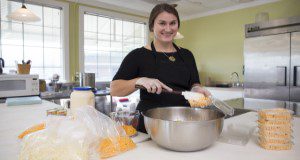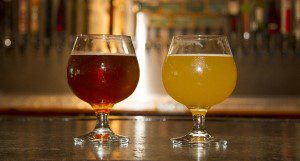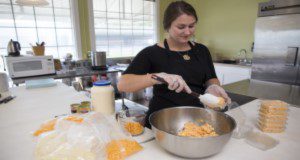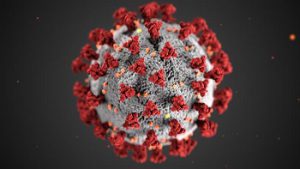In Florida, individuals can manufacture, sell, and store specific types of cottage food products in their primary home kitchen in accordance with Florida Statute 500.80. This new 3-page fact sheet, written by Sarah M. Ellis, Jennifer Hagen, and Matthew D. Krug and published by the UF/IFAS Food Science and Human Nutrition Department, provides basic information and resources for clientele who are interested in starting a food-based business out of their home kitchen. This document is one in a “Florida Food Entrepreneur” series, which seeks to assist new and established food entrepreneurs by providing information on topics relevant to food-based businesses.
https://edis.ifas.ufl.edu/fs425
Category: Food Safety
A Guide to Carbonating Beverages at Small Scale
The objective of this new 5-page guide is to provide information on how to successfully carbonate beverages on a small scale. Included is information on the benefits of carbonation, common carbonation levels, pros and cons of different carbonation methods, standard procedures to achieve a specific carbonation level, and economic considerations for manufacturers. Written by Xuwei Song, Nicholas Wendrick, Charles A. Sims, and Andrew MacIntosh, and published by the UF/IFAS Food Science and Human Nutrition Department.
https://edis.ifas.ufl.edu/fs379
An Introduction to Shared-Use Commercial Kitchens
Shared-use commercial kitchens are commonly used by food entrepreneurs to launch new food products into market; however, there remain questions about how these facilities work. This new 4-page document defines basic terms used to describe shared-use commercial kitchens, such as incubator, accelerator, or food hub, and gives an overview of potential services or resources available at these facilities. Furthermore, basic information on state level food regulations and an extensive list of shared-use commercial kitchens in Florida is included. Written by Matthew Krug and Sarah Ellis and published by the UF/IFAS Food Science and Human Nutrition Department.
https://edis.ifas.ufl.edu/fs400
COVID-19 and Food Safety FAQ: Is Coronavirus a Concern at Grocery Stores? (Mandarin Chinese)
This is the Mandarin Chinese translation of FSHN20-20/FS348, COVID-19 and Food Safety FAQ: Is Coronavirus a Concern at Grocery Stores? It provides answers to a few frequently asked questions regarding COVID-19 and grocery stores. Written by Natalie Seymour, Mary Yavelak, Candice Christian, and Ben Chapman, and published by the UF/IFAS Food Science and Human Nutrition Department.
https://edis.ifas.ufl.edu/fs391
Is Coronavirus a Concern on Fresh Produce? (Mandarin Chinese)
This is the Mandarin Chinese translation of FSHN20-22/FS350, Is Coronavirus a Concern on Fresh Produce? It provides guidance relevant to COVID-19 regarding handling and consumption of fresh produce. Written by Natalie Seymour, Mary Yavelak, Candice Christian, and Ben Chapman, and published by the UF/IFAS Food Science and Human Nutrition Department.
https://edis.ifas.ufl.edu/fs389
COVID-19 Preventative Measures: Do-It-Yourself Cloth Face Coverings (Mandarin Chinese)
This is the Mandarin Chinese translation of FSHN20-31/FS373, COVID-19 Preventative Measures: Do-It-Yourself Cloth Face Coverings. It provides guidance for making and caring for facemasks. Written by Natalie Seymour, Mary Yavelak, Candice Christian, and Ben Chapman, and published by the UF/IFAS Food Science and Human Nutrition Department.
https://edis.ifas.ufl.edu/fs390
COVID-19 and Food Safety FAQ: Is Coronavirus a Food Safety Issue? (Mandarin Chinese)
This is the Mandarin Chinese translation of FSHN20-18/FS341, COVID-19 and Food Safety FAQ: Is Coronavirus a Food Safety Issue? It provides guidance related to COVID-19 regarding food production, handling, and packaging. Written by Natalie Seymour, Mary Yavelak, Candice Christian, and Ben Chapman, and published by the UF/IFAS Food Science and Human Nutrition Department.
https://edis.ifas.ufl.edu/fs387
COVID-19 and Food Safety FAQ: Is Coronavirus a Concern with Takeout? (Mandarin Chinese)
This is the Mandarin Chinese translation of FSHN20-22/FS349, COVID-19 and Food Safety FAQ: Is Coronavirus a Concern with Takeout? It provides answers to frequently asked questions regarding COVID-19 and takeout food. Written by Natalie Seymour, Mary Yavelak, Candice Christian, and Ben Chapman, and published by the UF/IFAS Food Science and Human Nutrition Department.
https://edis.ifas.ufl.edu/fs388
COVID-19 Preventative Measures: What to Do If You Are Sick (Mandarin Chinese)
This is the Mandarin Chinese translation of FSHN20-17/FS340, COVID-19 Preventative Measures: What to Do If You Are Sick. It provides guidance for seeking medical attention, staying away from others, and avoiding infecting others. Written by Natalie Seymour, Mary Yavelak, Candice Christian, and Ben Chapman, and published by the UF/IFAS Food Science and Human Nutrition Department.
https://edis.ifas.ufl.edu/fs386
Jere COVID-19: Pwodwi jaden ak izin anbalaj yo
Pandan ke pa gen prèv ki asosye viris COVID-19 la a yon pwoblèm sekirite alimantè, li se yon pwoblèm sante pou travayè yo paske li pwopaje l pa kontak moun ak moun oswa lè w manyen yon sifas ki kontamine. Manje pa parèt tankou yon kòz ki favorize transmisyon COVID-19 la, men menm pratik yo itilize pou evite maladi ou ka pran nan manje, menm pratik sa yo ta dwe itilize pou diminye chans kontaminasyon COVID-19 la nan nan pwodwi alimentè ki fre yo epi risk pou COVID-19 ta simaye l pami travayè agrikòl yo ak sa kap travay nan izin anbalaj yo.
This new 2-page publication of the UF/IFAS Food Science and Human Nutrition Department is the Haitian Creole translation of FSHN20-25, Handling COVID-19: Produce Farms and Packinghouses. Written by Laurel Dunn (UGA) and translated by Emmanuel Duvalsaint.
https://edis.ifas.ufl.edu/fs385
Etalaj fwi, legim ak lòt pwodwi agrikòl nan peryòd COVID-19: kisa machann yo ka fè pou pwoteje tèt yo ok kliyan yo
Agrikiltè ak kliyan yo pa dwe ale kote yo etale fwi, legim ak lòt pwodwi agrikòl pou vann si yo gen sentòm COVID-19 la, oswa si yo ta antre an kontak ak yon moun ki malad. Nenpòt moun ki ta gen sentòm yo ap kite espas sa a.
This new 2-page publication of the UF/IFAS Food Science and Human Nutrition Department is the Haitian Creole translation of FSHN20-28, COVID-19 and Farm Stands: Steps for Farm Stand Operators. Written by Natalie Seymour, Mary Yavelak, Candice Christian, and Ben Chapman (all of NCSU) and translated by Emmanuel Duvalsaint.
https://edis.ifas.ufl.edu/fs384
COVID-19 Preventative Measures: Facemasks and Cloth Face Coverings
These five new flyers in the COVID-19 Preventative Measures series, written by Natalie Seymour, Mary Yavelak, Candice Christian, and Ben Chapman of NC State University, provide guidance on the benefits and proper use of facemasks and cloth face coverings in nonmedical settings, including for food employees. Published by the UF/IFAS Food Science and Human Nutrition Department.
https://edis.ifas.ufl.edu/fs371
https://edis.ifas.ufl.edu/fs372
https://edis.ifas.ufl.edu/fs373
https://edis.ifas.ufl.edu/fs374
https://edis.ifas.ufl.edu/fs375
COVID-19 and Farm Stands: Steps for Farm Stand Operators
This new flyer, written by Natalie Seymour, Mary Yavelak, Candice Christian, and Ben Chapman (NCSU) and published by the UF/IFAS Food Science and Human Nutrition Department, provides information on best practices, communication with customers, and cleaning and disinfection for farm stand operators. The original version of this flyer was published at https://foodsafety.ces.ncsu.edu/covid-19-resources/.
https://edis.ifas.ufl.edu/fs370
Handling COVID-19: Best Practices for Agribusiness
COVID-19 is spread primarily via close person-to-person contact, or when virus-containing droplets expelled during coughing or talking contaminate a surface that is later touched by a healthy individual. While most feed and supply stores continue to operate during disease outbreaks and other emergencies, preventive steps can be taken to protect the health of employees and customers. The original version of this flyer was published at https://foodsafety.ces.ncsu.edu/covid-19-resources/. Written by Tom Maddox and Laurel Dunn (University of Georgia) and published by the UF/IFAS Food Science and Human Nutrition Department.
https://edis.ifas.ufl.edu/fs369
COVID-19: Medidas preventivas: Lavando y desinfectando bolsas reutilizables
This is the Spanish language version of FSHN20-24/FS354, COVID-19 Preventative Measures: Cleaning and Disinfecting Reusable Bags. The original version was published at https://foodsafety.ces.ncsu.edu/covid-19-resources/.
https://edis.ifas.ufl.edu/fs368
Handling COVID-19: Produce Farms and Packinghouses
While there is no evidence that the COVID-19 virus is a food safety concern, it is a worker health concern because it spreads via close person-to-person contact or by contact with contaminated surfaces. Food does not appear to be a likely cause of COVID-19 transmission, but many of the same practices used to prevent foodborne illness on foods should still be used to reduce the likelihood of COVID-19 contamination on fresh produce and the risk of COVID-19 spread among farm and packinghouse workers. This material is adapted from the version published at https://foodsafety.ces.ncsu.edu/covid-19-resources/. Written by Laurel Dunn and published by the UF/IFAS Food Science and Human Nutrition Department; 2 pages.
https://edis.ifas.ufl.edu/fs366
Preguntas Frecuentes del COVID-19 para Fincas “U-PICK”: Instrucciones para Gerentes de Fincas
*Buenas practicas
*Comunicación con los clientes
*Limpieza y desinfeccion
*La buena noticia
This new two-page article is the Spanish-language translation of FSHN20-15/FS338, COVID-19 FAQ for U-Pick Farms: Steps for Farm Managers.Written by Natalie Seymour, Mary Yavelak, Candice Christian, and Ben Chapman, translated by Fernando Alferez, and published by the UF/IFAS Food Science and Human Nutrition Department.
https://edis.ifas.ufl.edu/fs358
Preguntas frecuentes sobre el COVID-19 para los mercados agrícolas: Instrucciones para los mercados y administradores de mercados
*Las mejores prácticas
*Comunicación
*Limpieza y desinfección
*Las buenas noticias
This new two-page document is a Spanish-language translation of FSHN20-03/FS326: COVID-19 FAQ for Farmers Markets: Steps for Markets and Market Managers. Written by Natalie Seymour, Mary Yavelak, Candice Christian, and Ben Chapman, translated by Cesar Asuaje, and published by the UF/IFAS Food Science and Human Nutrition Department.
https://edis.ifas.ufl.edu/fs362
COVID-19 and Food Safety FAQ: Shopping and Handling Groceries
This new one-page flyer answers food safety questions about preventing COVID-19 transmission when grocery shopping and handling groceries. Written by Natalie Seymour, Mary Yavelak, Candice Christian, and Ben Chapman (NC State University Extension) and published by the UF/IFAS Food Science and Human Nutrition Department.
https://edis.ifas.ufl.edu/fs367
COVID-19: Seguridad de Alimentos: Me debo preocupar del coronavirus cuando voy al supermarcado?
¿Me debo preocupar del coronavirus cuando voy al supermercado?
¿Me pudiera enfermar con el COVID-19 si toco alimentos o paquetes que han estado en contacto con este virus?
¿Cómo debo manipular las frutas y verduras?
¿Qué pasos puedo tomar para disminuir el riesgo de contaminación cuando voy al supermercado?
¿Qué está haciendo mi tienda para minimizar mi riesgo?
This is a Spanish language version of FSHN20-20/FS348, COVID-19 and Food Safety FAQ: Is Coronavirus a Concern at Grocery Stores?, written by Natalie Seymour, Mary Yavelak, Candice Christian, and Ben Chapman (NC State University Extension), and published by the UF/IFAS Food Science and Human Nutrition Department.
https://edis.ifas.ufl.edu/fs365




